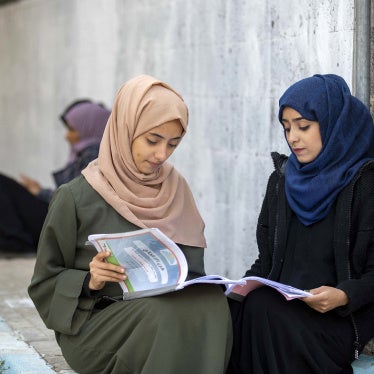Human Rights Watch welcomes the Universal Periodic Review report on Tunisia, which includes recommendations to improve the situation of human rights in a context of democratic transition. Although Tunisia’s government accepted many of these recommendations, it also rejected several critical ones aimed at preventing a sliding back into authoritarianism. Tunisia still needs to take concrete steps to reform the judiciary, protect free speech and guarantee freedom of the media.
Tunisia has given its preliminary acceptance to the recommendations regarding the need to reform the judiciary and to ensure accountability for past crimes. Human Rights Watch urges the government to translate this into action, by adopting the law on the High Council of the Judiciary, with full institutional, financial and legal guarantees of independence. The hegemony of the executive branch over the judiciary has continued unabated in post-revolution Tunisia, as the government has failed to undertake a reform of the judiciary. With the failure of the constituent assembly to pass a law installing a temporary High Council of the Judiciary, the Ministry of Justice has been directly supervising the judiciary, including the appointment, promotion, and discipline of judges, tightening the grip of the executive power on the judicial system.
Tunisia has also expressed its support for the UPR recommendation that it “ensure that the fundamental rights to freedom of expression, association and assembly will be guaranteed in the future Constitution, in line with Tunisia’s international obligations.” Tunisia has witnessed over the last months a setback in freedom of expression. The government has refused to implement decree law no.116, which requires the creation of an independent body for the supervision of state broadcast media. In addition, Tunisia should also reconsider the article of the draft constitution prepared by the National Constituent Assembly that criminalizes all attacks on the "sacred": The adoption of such an article would likely pave the way for restrictions on peaceful expression of dissenting or non-conformist views on religion.
Tunisia has also expressed its support for the recommendation that it “ensure that the principle of equality between men and women is clearly formulated in the new Constitution and apply it in practice through concrete measures.” Despite this commitment, the draft constitution elaborated by the NCA, makes no explicit mention of gender equality. Rather, the draft constitution contains an article where women are described as “partners” of men in building the nation and stating their “complementary” roles inside the family. Tunisia should delete the constitutional references to the complementary gender roles as it would risk diluting the principle of equality between men and women and entrenching social stereotypes of their roles in society.








